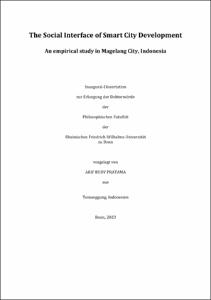Pratama, Arif Budy: The Social Interface of Smart City Development : An empirical study in Magelang City, Indonesia. - Bonn, 2023. - Dissertation, Rheinische Friedrich-Wilhelms-Universität Bonn.
Online-Ausgabe in bonndoc: https://nbn-resolving.org/urn:nbn:de:hbz:5-71445
Online-Ausgabe in bonndoc: https://nbn-resolving.org/urn:nbn:de:hbz:5-71445
@phdthesis{handle:20.500.11811/11019,
urn: https://nbn-resolving.org/urn:nbn:de:hbz:5-71445,
author = {{Arif Budy Pratama}},
title = {The Social Interface of Smart City Development : An empirical study in Magelang City, Indonesia},
school = {Rheinische Friedrich-Wilhelms-Universität Bonn},
year = 2023,
month = aug,
note = {What happens when a local government at the city level adopts the smart city concept as its urban development strategy? In this study, I pose an inquiry into how smart city policy is made and implemented in everyday urban life. I define smart city development as government interventions outlined in official policies to achieve excellent urban services and improved quality of life by optimizing cities’ resources using innovative solutions. The research situates smart city development as a policy process. This allows investigating the interactions between smart city actors in (re)shaping smart city policy-making and implementation. Borrowing the concept of social interface framework and multiple governance approach, the present study considers the socio-political dimensions of smart cities. The empirical investigation lies at the intersection between actors’ life worlds and social fields in which different interests, knowledge, and power interact. I focus my research on smart city development in Magelang City, Indonesia. This city has won the Indonesian Smart City Ranking in 2015, 2017, 2019, and 2021. It is also one of the smart city nominees in ‘100 smart cities movement’, a national program launched by the Indonesian Ministry of Communication and Informatics (Kemenkominfo). This study is based on ten-month ethnographic fieldwork. During the fieldwork, I combined observation, semi-structured interviews, unstructured interviews, focus group discussions and documentations as data collection methods. Like other smart city initiatives in the Global South, Magelang Smart City is characterized by top-down and government-led technocratic design with lack of involvement from the city residents. The Magelang City government designed the city’s future in the smart city masterplan, but the ideal implementation did not come into being. The social interface between actors (re)shaped the smart city development dynamics. The dynamics transpired in forms of contestation, resistance, negotiation, collaboration, and competition. These constitute the ways in which smart city development is executed. The projects also demonstrated policy paradoxes consisting of policy successes and unintended consequences. Although the Magelang Smart City contributed to improved urban services and urban quality of life, it also, to some degrees, implied actor latent pursuits such as city branding strategy, quest for prestige-symbolic politics, overclaiming successful projects, and the glorification of technologies.},
url = {https://hdl.handle.net/20.500.11811/11019}
}
urn: https://nbn-resolving.org/urn:nbn:de:hbz:5-71445,
author = {{Arif Budy Pratama}},
title = {The Social Interface of Smart City Development : An empirical study in Magelang City, Indonesia},
school = {Rheinische Friedrich-Wilhelms-Universität Bonn},
year = 2023,
month = aug,
note = {What happens when a local government at the city level adopts the smart city concept as its urban development strategy? In this study, I pose an inquiry into how smart city policy is made and implemented in everyday urban life. I define smart city development as government interventions outlined in official policies to achieve excellent urban services and improved quality of life by optimizing cities’ resources using innovative solutions. The research situates smart city development as a policy process. This allows investigating the interactions between smart city actors in (re)shaping smart city policy-making and implementation. Borrowing the concept of social interface framework and multiple governance approach, the present study considers the socio-political dimensions of smart cities. The empirical investigation lies at the intersection between actors’ life worlds and social fields in which different interests, knowledge, and power interact. I focus my research on smart city development in Magelang City, Indonesia. This city has won the Indonesian Smart City Ranking in 2015, 2017, 2019, and 2021. It is also one of the smart city nominees in ‘100 smart cities movement’, a national program launched by the Indonesian Ministry of Communication and Informatics (Kemenkominfo). This study is based on ten-month ethnographic fieldwork. During the fieldwork, I combined observation, semi-structured interviews, unstructured interviews, focus group discussions and documentations as data collection methods. Like other smart city initiatives in the Global South, Magelang Smart City is characterized by top-down and government-led technocratic design with lack of involvement from the city residents. The Magelang City government designed the city’s future in the smart city masterplan, but the ideal implementation did not come into being. The social interface between actors (re)shaped the smart city development dynamics. The dynamics transpired in forms of contestation, resistance, negotiation, collaboration, and competition. These constitute the ways in which smart city development is executed. The projects also demonstrated policy paradoxes consisting of policy successes and unintended consequences. Although the Magelang Smart City contributed to improved urban services and urban quality of life, it also, to some degrees, implied actor latent pursuits such as city branding strategy, quest for prestige-symbolic politics, overclaiming successful projects, and the glorification of technologies.},
url = {https://hdl.handle.net/20.500.11811/11019}
}






